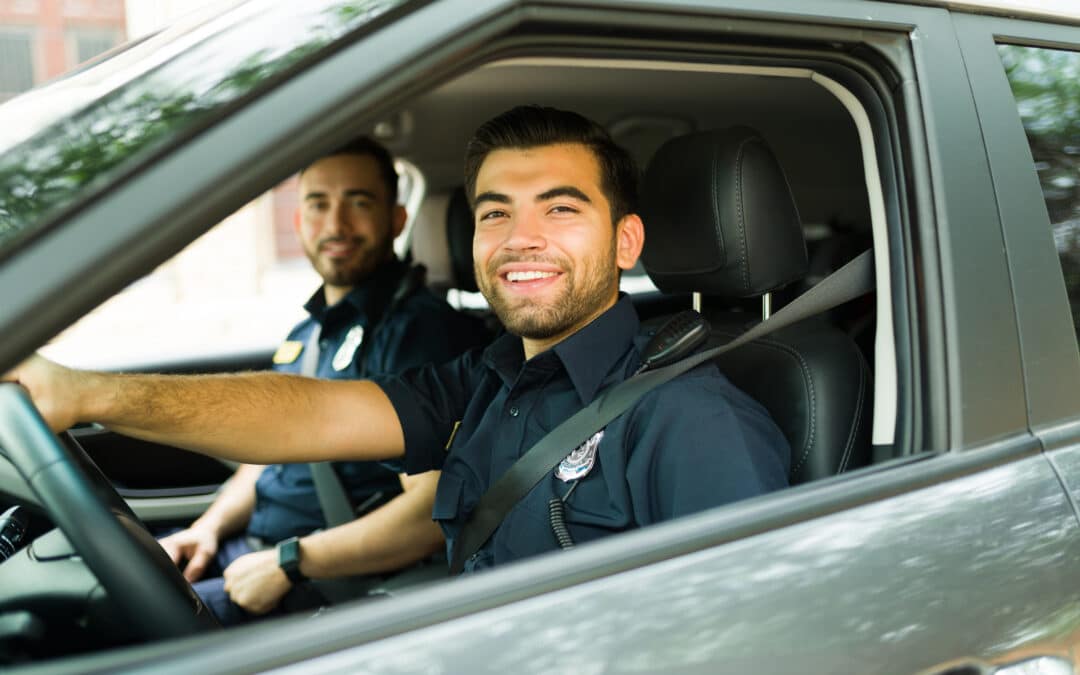Protecting the public is a risky job, and today’s police force has to deal with many threats and dangers. Staying safe on the job is important to your community, your department, and your family. Here are eleven police officer safety tips so that you can help protect yourself while working.
1. Wear Your Seat Belt
Seat belts save lives—thousands per year. The National Safety Council estimates that seat belts have saved nearly 375,000 lives between their introduction in 1975 and 2017.
It can be tempting to skip the seat belt, especially if you know you’re going to have to get out of the car quickly, but 85% of all car accident survivors were wearing their seat belts at the time of the crash. Police officers often face challenging traffic situations and high-speed highway driving. Your seat belt is one of the easiest and most effective ways to keep yourself safe.
2. Wear Your Bulletproof Vest
Firearms represent a significant and life-threatening challenge for law enforcement officers in the United States. Over the last thirty years, ballistic-resistant soft body armor—the official name for bulletproof vests—has been instrumental in saving the lives of over 3,000 police officers.
Body armor has an indispensable role as essential safety gear for the personal protection of both law enforcement and corrections personnel. In fact, 92% of all felonious deaths of officers in the line of duty are due to firearms; wearing the vest might make the difference that lets you make it home after a worst-case scenario.
3. Drive Safely
Car accidents are another leading cause of officer death. On average, about 50 officers per year die due to car crashes, according to the National Institute for Occupational Safety and Health. Driving safely and free of distractions is vital for staying safe on the road.
4. Don’t Become Complacent (Stay Sharp)
In the field, complacency can be a dangerous adversary, as it may lead to lapses in judgment, slower reaction times, and potentially dire consequences. Staying sharp involves remaining vigilant and proactive, even during routine interactions.
It also means keeping your cool with suspects. Avoid verbal traps and escalation by going back and forth or arguing with a suspect. Instead, keep talking to a minimum and avoid rising to taunts– there will be plenty of time to interrogate a suspect back at the station house.
5. Focus on What’s Important Now
When you’re in the field, there are a million things to worry about. Don’t make it a million and one by dwelling on the past or worrying about what’s going to happen next.
Whether responding to emergency calls, conducting investigations, or engaging with the community, maintaining a sharp awareness of your immediate surroundings and the specific task at hand is paramount. To stay safe, focus on the now. Set aside distractions to prioritize your own safety and make quick, informed decisions about what to do.
6. Read Suspect Behavior
Your instincts and training as a police officer give you insight into human behavior. Pay attention to what your suspect is doing—not just what they’re saying. What does their body language tell you? It often holds unspoken truths that can be critical in making informed decisions and ensuring the safety of all involved.
Pay attention to what your suspect’s behavior is telling you, and be ready to intervene. Remember that attacks can happen quickly, so get ahead of them by paying close attention to the people around you.
7. Take Care of Your Mental Health
Your mental health is important, and taking care of it doesn’t make you weak—it means you’re strong enough to recognize when you need help. Mental healthcare helps you be a better officer and community member. Debriefing sessions and counseling after traumatic events help keep you in a good headspace.
If you’re not dealing with unacknowledged trauma or stress, you are distracted in the field—and that interferes with your performance. Your community and your department need you, and nobody will think you’re a liability for getting mental health help. Instead, they’ll think you’re becoming a better, more capable officer who puts their needs ahead of their pride or their fears.
8. Brush Up on First Aid Training
First aid training can save your life—or your partner or even a bystander who gets caught in the wrong place at the wrong time. First aid training can help you stop bleeding, identify different types of acute trauma, and help keep someone alive until EMS gets there. It’s likely that your precinct offers additional training, and the Red Cross always has online and in-person classes available for law enforcement.
9. Always Have a Backup
Running into dangerous situations on your own never ends well. Sure, it might seem like the best course of action at the moment, especially during a pursuit—if you don’t have a backup, you run the risk of getting hurt and having no way to radio for help. It’s always best to wait until your partner or some other backup is with you.
10. Think Before You Act
Part of your training as a police officer involved learning to overcome your first flight or fight reaction. As a law enforcement official, you are regularly faced with situations where the average citizen wouldn’t know what to do. You have the training, experience, and responsibility to have a better response to dangerous situations, but you need to think before you act. Don’t just charge in.
A huge part of officer safety is learning to read a situation and know what the correct actions are. Police work is about trusting yourself, and sometimes, that means knowing when your first instinct is actually the wrong thing to do.
11. Leave Your Body Cam On
Body cams aren’t just there to protect the public; they’re there to protect you. Most likely, your department has rules about needing to leave your body cam, dash cam, and other cameras on at all times. These rules aren’t in place for unnecessary surveillance; they are there to keep your liability limited and to make sure that if anything goes wrong, you are protected.
At TCS Upfitting, we know how much it takes to keep police officers safe on the job. Officers need lots of support from their departments, and that includes keeping their cars up-to-date and ready to respond to any emergencies. To upfit your department’s vehicle needs, contact TCS Upfitting for our wide range of quality services.


